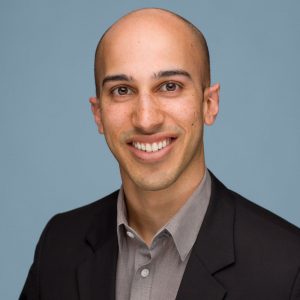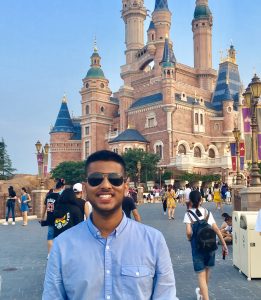
Rakesh Apte
Majors: BHP, Economics
Featured: Impact Investing, Entrepreneurship, Working Abroad, Emerging Markets
Rakesh Apte, BHP 2007, is an Investment Director at the Global Innovation Fund, which invests in social innovations that aim to improve the lives and opportunities of millions of people in the developing world. Rakesh has also worked as an investment manager for Eleos, a business development manager for H2O Venture Partners and a strategy manager for Microsoft.
Take me through your career so far.
While finishing up college, I thought I wanted to work in quantitative finance. I went to work for D.E. Shaw, a hedge fund in New York doing quantitative finance, but found that I was more interested in the fundamentals of business and technology. I made a shift and joined Microsoft. I worked there for several years in corporate strategy, finance, and M&A across various product groups including the cloud computing group and the Windows group. Our team was tasked with analyzing trends in the industry, identifying disruptive technologies, and evaluating Microsoft’s ability to compete with new technologies.
During my time at Microsoft, I took a post in Turkey, Microsoft’s Middle East & Africa headquarters. That was my introduction to technology and business in emerging markets. After 4.5 years at Microsoft, I decided to transition my career to technology startups and venture capital investing. I decided to do a MBA at Berkeley’s Haas School of Business to learn how to integrate the core business skills I developed at Microsoft into the progressive work of impact investing. During my time at Haas, I worked at a venture fund focused on commercializing technologies and supporting new startups in emerging markets. After that experience, I worked for a few years with another fund – Eleos – based in California. Eleos is a pioneering for-profit social venture fund that invested in several companies in India, Africa and Latin America. When I moved to Washington D.C. to support my wife’s career, I joined the Global Innovation Fund where I have spent the last few years investing up to $15 million per investment in Seed to Series C stage companies.
What are the challenges of investing in startups in emerging markets?
The venture capital industry is about successful exits. As an industry, we have yet to see whether investing in impactful startups in emerging markets will lead to successful exits. These are tough business environments which make it challenging to apply the same venture capital template we have in Silicon Valley to impact investing. We are starting to see success through interest from first-world commercial entities. They see the opportunity to make money while contributing to the social good. The amount of interest and money that has been invested in these startups is a positive indication, but we are waiting for these companies to mature and become successful acquisition opportunities or even publicly traded companies. We have seen a few successful exits from double-bottom line companies here in the US such as Coca-Cola’s acquisition of Odwalla, Unilever’s acquisition of Ben & Jerry’s, or Clorox’s acquisition of Burt’s Bees However, one of the inherent differences between startups in emerging markets and those in the United States is that companies may achieve high volume but not the profit margins that are expected from traditional institutions. This is exactly the setback that one of Eleos’ earlier portfolio companies in India faced when it started to scale. They were providing services to over 500k customers a day and were profitable, but private equity players were not excited about the economic upside of the business given its lower profit margins. Overall, the industry’s long-term goals are to achieve large-scale impact while delivering risk-adjusted financial returns for investors. Success for the Global Innovation Fund would be a portfolio of companies which have scaled to millions, provided liquidity to investors, and continue to deliver impact that is inextricably linked to the core business.
What is an example of positive change you have seen from investments your funds have made?
Two examples come to mind. One example we invested in while I was at Eleos is a company in the edtech sector called Eneza Education that is making affordable education available to those who have limited access to it. They have an innovative digital platform that is providing interactive study content to millions of customers across Africa. Their mobile phone based solution is particularly powerful for students outside of major cities who attend significantly under-resourced schools and have low national exam passage rates.
Another example is a company called SafeBoda based in Kampala, Uganda. This is one of the investments I am most proud of because the company is solving an important safety problem, one that directly affected my close childhood friend. Back in 2010, my friend was tragically killed in a motorcycle accident in Kampala. In Kampala, and in some other major cities in emerging markets, it is common to take motorcycles as taxis. SafeBoda is disrupting the status quo of unsafe, helmetless driving by allowing people to use an uber-like app to call a safe motorcycle taxi driver – one that has received special training and is required to provide helmets for riders. Now riders in Kampala are taking thousands of safe rides per day while setting a new standard for drivers in Kampala with the hope that this model can scale up quickly to other cities with similar road traffic issues.
What are you responsible for in your role as Investment Director at the Global Innovation Fund?
We are a geography agnostic investment fund that has invested in startups working across sectors including in clean energy, fintech, agriculture, and smart cities. In my role, I seek out cutting-edge private sector startups that have a clear plan for delivering financial and impact returns and have a strong team to get to scale. I assess the market opportunity and risk through rigorous due-diligence which includes an onsite visit to the company’s headquarters. Most recently, I was in Nigeria evaluating a later-stage fintech company that is looking to help Nigeria evolve from a fully cash-dominated society to one that uses digital payments and digital financial services. I am also responsible for structing investments and adding value after the investment is made. This includes sitting on Boards, providing advice on growth planning, and mentorship. As an early employee of the Global Innovation Fund, I contributed to setting up the investment process and thesis development.
You have travelled extensively throughout your career. What have you enjoyed most about that and how do you think seeing the world and other cultures has affected your work and you personally?
Traveling around the world and experiencing various cultures first-hand is life-changing. There are a number of differences across countries in what the general population has access to in terms of resources and opportunities. Professionally, this has made me a smarter investor, as I am better able to understand what the real needs and challenges are in these countries. Personally, I have enjoyed meeting people from various backgrounds and forming life-long friendships.
For students interested in impact investing, what advice would you give them and what would you tell them about where you think the industry is headed in the future?
Don’t be discouraged if you aren’t able to immediately get into the industry full-time. There is value in cutting your teeth in more traditional business roles such as in finance or management consulting. You need to spend time developing core skills, which will allow you to provide value to the industry. Impact investing is still evolving and is competitive to break in to full-time. However, if you have a diversity of experiences in areas such as investing, working with startups, and travel, you can leverage these skills to join an impact investing fund. Showing genuine interest in the sector through pro-bono projects can also help. It is important to remember that impact investing is not just international facing. There are domestic funds investing in local startups solving issues such as in healthcare or education. Finally, keep in mind that there isn’t one specific set of experiences you need to get into impact investing. The opportunities in the sector are growing quickly so keep learning about the various types of funds and startups.
 Avish Patel
Avish Patel 


 Swetha Davuluru – Deloitte, Houston
Swetha Davuluru – Deloitte, Houston